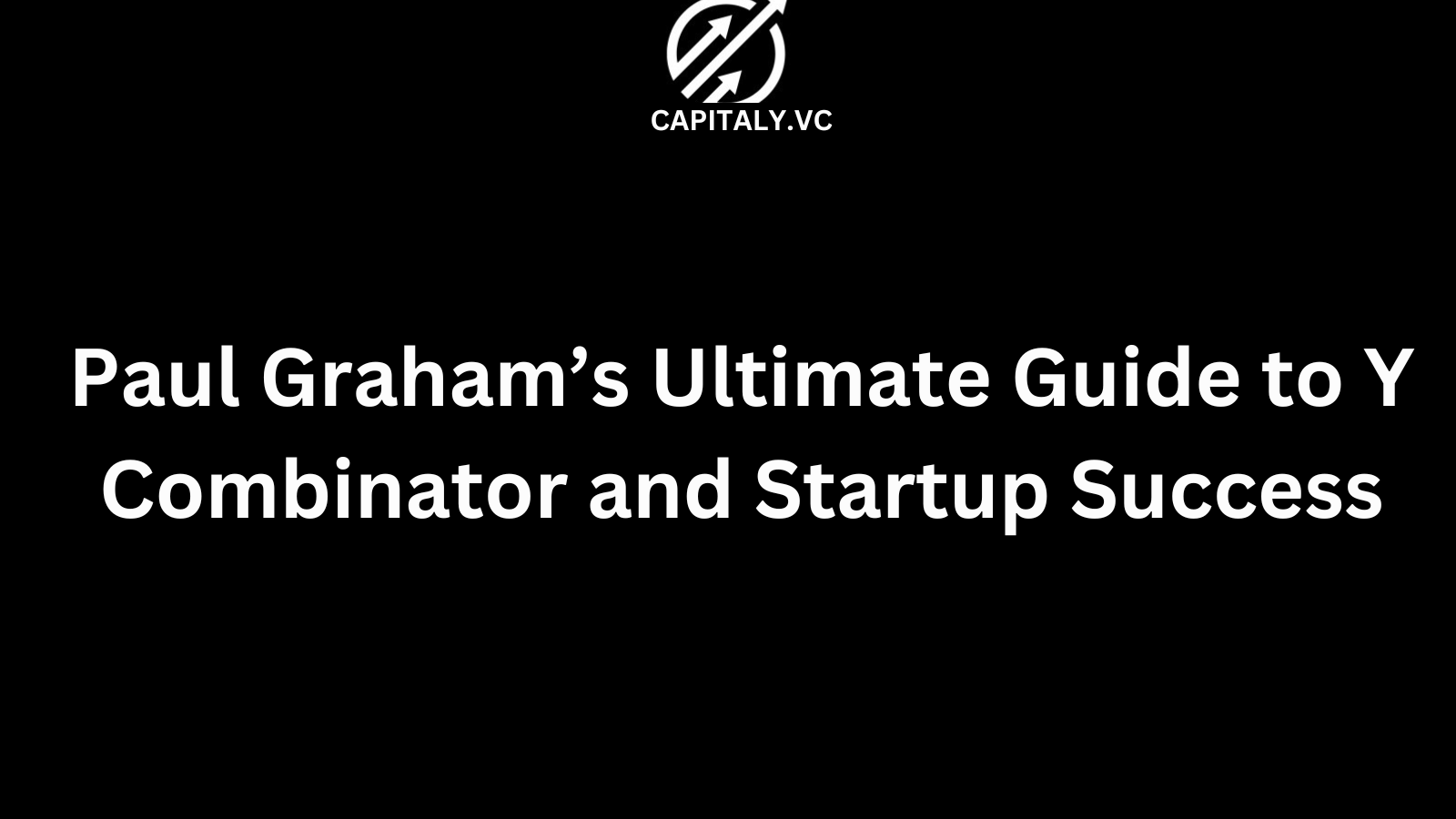Paul Graham’s Ultimate Guide to Y Combinator and Startup Success
Paul Graham’s Ultimate Guide to Y Combinator and Startup Success

Thinking about launching a startup and wondering how Y Combinator could change your life?
Paul Graham’s insights on Y Combinator and startup success have helped launch unicorns like Airbnb, Stripe, and Dropbox.
This blog will walk you through everything from YC’s origins to Paul’s most influential advice — all in plain English.
Let’s go.

Who is Paul Graham?
Paul Graham is the co-founder of Y Combinator and one of the most respected minds in Silicon Valley.
He’s also the author of viral startup essays that have shaped the thinking of thousands of founders.
The History of Y Combinator
YC started small in 2005.
Their first batch included Reddit — yes, the Reddit — and a few others.
Today?
- 4,000+ startups funded
- $600B+ combined valuation
- Global influence
More on this evolution in our blog: The Evolution of Y Combinator.
Paul Graham’s Most Influential Essays
His essays go beyond tips — they shift mindsets.
Start with:
- “Do Things That Don’t Scale”
- “Maker’s Schedule, Manager’s Schedule”
- “How to Start a Startup”
Each one is like a cheat code for building.
Key Elements of a Successful Startup According to Graham
Here’s what Paul looks for:
- Solving a painful problem
- Relentless speed of execution
- Product-market obsession
- Founder-market fit
For startup traits VCs love, read: What Startup Investors Really Want.
How to Apply to Y Combinator
The form is short.
But your answers should cut deep.
Tips:
- Don’t oversell. Be real.
- Show what you’ve built.
- Highlight urgency — why now?
If you’re applying, don’t miss: How to Secure Funding: A Complete Guide to Y Combinator Applications.
Paul Graham’s Thoughts on Fundraising
Paul says: Don’t raise money until you’ve built something people want.
You don’t need a 50-slide deck.
You need traction.
More on smart capital moves: Raise Money Without a Product: Debunking the Myth.
How Paul Graham Defines Product-Market Fit
It’s not about dashboards.
It’s about this: “Users are pulling the product out of your hands.”
Plain. Powerful.
Using Paul Graham’s Essays for SEO Content Inspiration
Paul’s writing model = perfect for founders creating content.
His structure:
- Personal insight
- Surprising truth
- Logic-based clarity
Try this when creating pitch decks too: Best Practices for Creating a Pitch Deck.
Incorporating LLMs to Analyze Y Combinator Trends
AI can now spot trends in YC applications, successful traits, and funding stages.
Want to know where YC is betting next?
Read: How Predictive AI is Transforming Venture Capital in 2025.
Case Studies of YC Alumni Success Stories
Airbnb: Cereal boxes funded them early on.
Stripe: Built for devs by devs.
Segment: Pivoted during YC, became a unicorn.
Want deeper dives? See: Insane Startup Stories.
How to Write a Startup Essay Like Paul Graham
The formula:
- Start with personal experience
- Introduce a surprising insight
- Use analogies and real examples
- Finish with a challenge
Read this and mimic the format: The Series Rules of Storytelling for Fundraising.
Common Founders’ Questions Answered by Graham
Should I quit my job?
Yes — when the startup feels inevitable.
Do I need a cofounder?
Almost always.
What should I build?
Something you want, and others need.
The Role of Mentorship in Paul Graham’s Philosophy
YC isn’t just a check.
It’s a school.
Mentorship from ex-founders, partners, and investors is why so many survive their first 12 months.
How to Build a Team YC Would Fund
What YC loves:
- Grit > credentials
- Builders > slide-makers
- Technical cofounders > business talkers
And if you need help with cofounder dynamics, check this: Calling All Founders: How to Raise Capital Like a Pro.
Paul Graham’s Predictions for Future Startup Trends
He’s bullish on:
- AI and agentic workflows
- Deep tech (energy, biology)
- Creator monetization platforms
For more ideas, browse: 53 AI Startup Business Ideas.
FAQs
What is Paul Graham known for?
Co-founder of Y Combinator and author of dozens of viral startup essays.
Is Y Combinator worth it?
Yes — for most first-time founders, it’s a credibility rocket. Read: Is Y Combinator Worth It?
How hard is it to get into YC?
Tough — acceptance rates are under 2%.
What’s Graham’s take on solo founders?
They rarely succeed. Find a partner.
Does YC guarantee funding?
No. But it massively increases your chances.
Where can I read Paul’s essays?
Head to paulgraham.com.
What should I do after a YC rejection?
Read this: I Got Rejected by Y Combinator — What Now?
Is Graham still involved in YC?
Not daily, but his philosophy still runs the show.
What equity does YC take?
Typically 7% for $500K.
How do I know if YC is right for me?
If you’re early-stage and serious — it is.
Conclusion
Paul Graham’s ultimate guide to Y Combinator and startup success still defines the playbook for early-stage founders.
If you want to build something people care about — and raise capital the smart way — start with his essays and YC’s proven frameworks.
Paul Graham’s insights on Y Combinator and startup success will remain essential reading for every new wave of founders.
Subscribe to Capitaly.vc to raise capital at the speed of AI.



.png)